Legitimacy and the Use of Ethnic Categories in Public Service Long- Term Insights Briefings
DOI:
https://doi.org/10.26686/pq.v21i2.9815Keywords:
long-term insights briefings, ethnicity, socio-demographic differences, reductionism, essentialism, in and between group variance, societal complexity, impartiality, political neutrality, public legitimacyAbstract
This article considers the way government agencies use the concept of ethnicity in their long-term insights briefings. Ethnicity receives a disproportionate focus compared with other socio-demographic categories. Yet the concept is treated as self-evident, and its manifold
limitations are unexplored. Salient outcome variations are reduced to average ethnic differences, and variation is further reduced, in an
essentialised manner, to comparisons between Māori, Pacific and the largely invisible others in the European and Asian categories. Human commonality and complex webs of micro-connections between people are not explored. Questions arise regarding whether the briefings’ treatment of ethnicity relative to other socio-demographic dimensions fulfils statutory obligations to be impartial and politically neutral. The article argues that the briefings’ treatment of ethnicity may undermine their public legitimacy. Significant recommendations for positive change are made.
Downloads
Downloads
Published
Issue
Section
License
Permission: In the interest of promoting debate and wider dissemination, the IGPS encourages use of all or part of the articles appearing in PQ, where there is no element of commercial gain. Appropriate acknowledgement of both author and source should be made in all cases. Please direct requests for permission to reprint articles from this publication to Policy-Quarterly@vuw.ac.nz.



